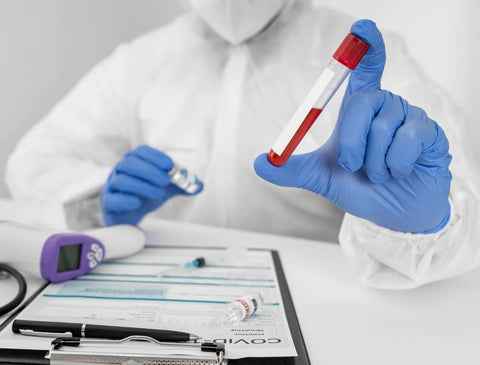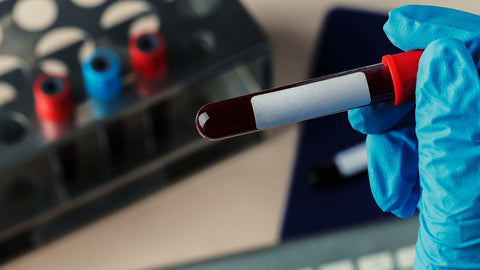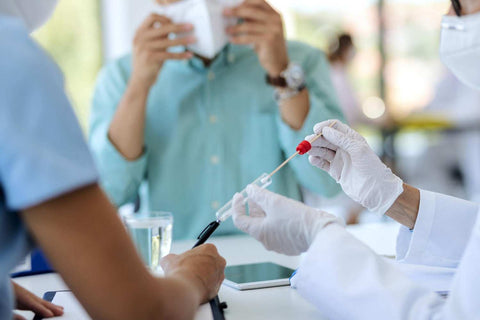How Quickly Will Doctor Call With Blood Test Results UK?


Blood tests are a foundation of modern medical diagnosis and treatment, playing a pivotal role in the early detection and management of a myriad of health conditions. From monitoring chronic illnesses to diagnosing infections, the value of these tests cannot be overstated. In the UK, where the healthcare system is guided by principles of efficiency and patient-centred care, the turnaround time for blood test results is a topic of significant interest to both patients and healthcare providers.
Professor Daniel, a leading haematologist at King's College London, emphasizes the criticality of blood tests in clinical practice: “Blood tests are the unsung heroes of medical diagnostics. They can give us a window into the body's complex systems, allowing us to evaluate everything from liver function to cholesterol levels.” This sentiment is echoed across the medical community, highlighting the integral role blood tests play in shaping treatment decisions.
The general expectation for receiving blood test results in the UK varies depending on several factors, including the type of test and the urgency of the situation. For standard, routine blood tests, results are typically available within a few days. However, for more urgent cases, such as those requiring immediate clinical decisions, results can be expedited, often being available within a few hours. Dr. Emily Johnson, a GP in Manchester, notes, “In urgent cases, such as suspected infections or critical conditions, we aim to get results back as quickly as possible – sometimes even the same day.”
Statistics from the NHS indicate that over 70% of clinical decisions in the UK involve a pathology test, with blood tests being the most common form. This underscores the significance of timely communication of results to ensure optimal patient care. In non-urgent scenarios, a standard timeframe of 24 to 48 hours is often expected for the return of results, but this can extend to a week or more for complex tests.
The key focus of this article, focusing on the response time of doctors in communicating blood test results, is intricately linked to the operational efficiencies of the UK healthcare system. The National Institute for Health and Care Excellence (NICE) guidelines recommend that results should be communicated to patients in a manner that supports prompt and effective clinical decision-making. As such, the systems in place for processing and communicating these results are designed to be both swift and accurate, balancing the need for thorough analysis with the urgency of medical care.
Moreover, the patient experience is greatly influenced by the timeliness of receiving these results. A study conducted by the University of Oxford revealed that prolonged waiting times for test results are associated with increased anxiety and stress among patients. Thus, the efficiency of blood test processing not only impacts clinical outcomes but also patient wellbeing.
Blood tests are a fundamental aspect of healthcare in the UK, with their timely analysis and communication being crucial for effective medical care. While the expected turnaround time for results can vary, the overarching goal within the UK healthcare system is to provide these results in a manner that is both prompt and conducive to the best possible patient outcomes. The efficiency of this process is a testament to the dedication of healthcare professionals and the robust infrastructure of the UK's medical system, striving to uphold the highest standards of patient care.
Blood tests are a vital diagnostic tool in modern medicine, offering a window into the complex inner workings of the human body. By analyzing a sample of blood, these tests can provide a wealth of information about a person’s health, including the functioning of organs, the presence of infections, and the risk of chronic diseases. Dr. Richard Taylor, a consultant in clinical biochemistry in London, explains, “Blood tests allow us to quantitatively assess a range of physiological and biochemical parameters, often giving us the first clues to a diagnosis.”
One fundamental aspect of blood tests is their ability to measure the levels of various blood components. This includes red and white blood cells, platelets, hemoglobin, and hematocrit. These counts can indicate conditions like anemia, infections, and blood clotting disorders. Moreover, blood tests can measure the concentration of substances such as glucose, cholesterol, electrolytes, and enzymes, offering insights into the functioning of organs like the liver and kidneys.
In the UK, several blood tests are routinely conducted, each serving a specific diagnostic purpose. The Complete Blood Count (CBC) is one of the most common tests. It provides a comprehensive overview of the cellular components of blood. Dr. Sarah Bennett, a hematologist, notes, “The CBC is often the starting point in blood testing. It can reveal signs of infections, anemia, and even certain cancers.”
Another frequently conducted test is the lipid panel, which measures cholesterol levels and is crucial in assessing cardiovascular risk. High levels of LDL cholesterol, often referred to as ‘bad cholesterol’, can indicate a higher risk of heart disease. The liver function test (LFT) is another common test, which assesses the health of the liver by measuring enzymes, proteins, and substances processed by the liver.
The turnaround time for blood test results can be influenced by a variety of factors. The complexity of the test is a primary factor. Dr. Taylor adds, “While a standard CBC might be processed quickly, more complex tests, like hormone levels or genetic testing, require more time.” The urgency of the clinical situation also plays a significant role. In emergency or critical care settings, blood tests are fast-tracked to provide rapid results, often within hours.
Laboratory capacity and efficiency are other crucial factors. A well-equipped laboratory with advanced automation can process tests more quickly than a smaller, less equipped facility. Additionally, the logistics of transporting and processing samples, especially in remote areas, can add to the waiting time. The NHS strives to optimize these factors to ensure timely results.
Blood tests are a cornerstone of diagnostic medicine in the UK, offering critical insights into a patient’s health. From routine CBCs to specialized tests, these analyses are integral to disease diagnosis and management. The efficiency of delivering these test results is influenced by multiple factors, including the nature of the test, the urgency of the clinical situation, and the capabilities of the processing laboratory, all of which are crucial in providing timely and effective patient care.
The processing speed of blood test results is influenced by several key factors, each playing a crucial role in determining how quickly patients can receive vital health information. Understanding these factors helps in setting realistic expectations for patients and healthcare providers alike.
The nature of the blood test itself is a primary factor. Basic tests, such as a Complete Blood Count (CBC), can typically be processed more rapidly due to standardized procedures. More complex tests, like those for genetic markers or hormone levels, require intricate analysis and consequently, more time. Dr. Fiona Reynolds, a clinical biochemist in Leeds, states, “The complexity of the test directly impacts the turnaround time. While a CBC might be ready within hours, tests for rare conditions could take days or even weeks.”

The urgency of the medical condition being investigated greatly influences the prioritization of test processing. Emergency situations, such as acute infections or life-threatening conditions, necessitate rapid test results. “In urgent cases, laboratories expedite processing to provide results as quickly as possible, often within the same day,” explains Dr. Reynolds.
Laboratory workload is another critical factor. High volumes of tests can lead to longer processing times, particularly in periods of high demand, such as during flu seasons or public health crises. The capabilities of the laboratory also play a role. Dr. Ian Murphy, a pathologist in Birmingham, notes, “Labs with advanced automation and more staff can handle larger volumes of tests more efficiently, reducing turnaround times.”
Where the test is conducted — in a hospital or an outpatient setting — also affects processing time. Hospital-based laboratories often process tests for their patients more quickly due to direct access to testing equipment and priority given to inpatients. Outpatient tests might take longer due to the need for transportation to external laboratories.
In the UK, the typical timelines for blood test results vary. For standard tests like a CBC or a lipid panel, patients can usually expect results within 1-2 days in non-urgent cases. Dr. Murphy adds, “For most routine tests, a 24- to 48-hour window is common. However, it's important for patients to understand that this can vary.”
For more urgent cases, results can be available within hours. This rapid turnaround is crucial in acute care settings where immediate clinical decisions are necessary. In contrast, specialized tests, such as those for genetic conditions or complex hormonal assays, may take several days to a few weeks.
Statistics from the NHS reveal that there is a continuous effort to reduce these timelines, with ongoing investments in laboratory technologies and processes. These improvements aim to enhance the overall efficiency of diagnostic services, ensuring that patients receive timely and accurate information for their medical care.
The time taken to process blood test results in the UK is influenced by the type of test, the urgency of the medical condition, laboratory workload, processing capabilities, and the testing setting. While typical timelines are generally efficient, especially in urgent cases, they can vary based on these factors. The NHS is committed to optimizing these processes to ensure prompt and effective patient care.
In the UK healthcare system, the timelines for receiving blood test results are generally well-defined, varying based on the nature of the test and the clinical context. Understanding these timelines is crucial for both healthcare professionals and patients in managing expectations and planning subsequent steps in treatment or diagnosis.
For standard non-urgent blood tests, such as Complete Blood Count (CBC), liver function tests, and basic metabolic panels, the results are typically available within 1 to 3 days. Dr. Alice Grant, a GP in Bristol, explains, “In routine cases, where immediate clinical decisions are not pending on the test results, patients can expect to hear back from us within a few days.” This timeline allows for the efficient processing of tests in a standard laboratory workflow without the need for expedited analysis.
In situations where the patient’s condition is critical or rapidly evolving, the tests are categorized as urgent. These include cases where immediate clinical decisions are necessary, such as suspected infections, acute kidney injury, or cardiac events. “For urgent tests, the results are often available within a few hours, sometimes even less,” states Dr. Grant. This rapid turnaround is crucial in acute care settings where treatment decisions must be made swiftly to address the patient’s condition.

Specialized tests, such as those for genetic conditions, hormone levels for endocrine disorders, or markers for certain cancers, require more complex analysis and hence, a longer processing time. These results can take anywhere from several days to a few weeks. “The complexity and sensitivity of these tests necessitate a more thorough analysis, which understandably takes more time,” remarks Dr. Helen Roberts, a consultant in clinical genetics in London.
The communication of blood test results is a critical aspect of patient care. In the UK, results are typically communicated by the GP or the specialist who ordered the test. For non-urgent results, this communication might be via a scheduled follow-up appointment, a phone call, or increasingly, through digital health portals where patients can access their results online.
In urgent scenarios, the results are communicated directly and promptly to the healthcare team responsible for the patient’s care, often leading to immediate clinical decisions and interventions. Dr. Roberts notes, “In urgent cases, the results are flagged to the medical team as soon as they are available, ensuring that no time is lost in responding to the patient’s needs.”
In specialized cases, particularly where results might have significant implications, such as genetic testing, the results are typically communicated in a face-to-face consultation. This allows for a detailed discussion of the implications of the results and the next steps in terms of treatment or further investigation.
The typical timelines for blood test results in the UK vary from a few hours to several weeks, depending on the urgency and complexity of the test. Communication of these results is handled with care, ensuring that patients receive timely information relevant to their health and treatment. The NHS continuously works to optimize these processes to enhance the quality and efficiency of patient care.
The communication of blood test results in the UK is a process guided by considerations of patient care, confidentiality, and clinical urgency. The method and timing of this communication largely depend on the nature of the test and the results it yields.
For standard, non-urgent blood tests, results are typically communicated by the General Practitioner (GP) or the specialist who requested the tests. Dr. Laura Hughes, a GP in Cardiff, explains, “For routine tests, I usually inform patients of their results at a follow-up appointment or through a phone call. If the results are normal and don’t require immediate action, we might send a letter or an SMS.”
In cases where the blood tests are urgent or if the results indicate a serious health issue, the communication is more immediate. “If a blood test reveals something concerning, or if it’s an urgent test, we make it a priority to contact the patient directly and promptly, usually via a phone call,” says Dr. Hughes. This ensures that necessary clinical actions can be taken without delay.
The role of electronic health records (EHRs) and patient portals in the UK has been growing steadily. These digital platforms allow for more efficient and secure communication of health information, including blood test results. Patients can log in to these portals to view their results, which is especially convenient for managing chronic conditions or for those who prefer online communication. Dr. Simon Patel, an IT consultant for the NHS, notes, “EHRs and patient portals have revolutionised the way we share medical information with patients, making it more accessible and streamlining the communication process.”
Delays in receiving blood test results can occur due to various reasons, such as laboratory backlogs, technical issues, or the complexity of the tests. When there is a delay, patients are advised to follow up with their GP or the healthcare professional who requested the test.
Dr. Hughes advises, “If you haven’t received your results within the expected timeframe, it’s important to contact your GP’s office. Often, it could be a simple case of miscommunication or administrative delay.”
In cases of significant delays, particularly where the results are crucial for ongoing treatment or diagnosis, healthcare providers often take proactive steps. “If we're aware of a delay that could impact patient care, we try to expedite the process and keep the patient informed,” adds Dr. Hughes.
The communication of blood test results in the UK is a critical component of patient care, carried out with attention to timeliness, accuracy, and patient confidentiality. While the majority of results are communicated efficiently, delays can occur, and in such cases, both healthcare providers and patients play a role in ensuring the timely receipt and discussion of these vital health indicators. The increasing use of electronic health records and patient portals represents a significant advancement in this communication process, offering patients more direct access to their health information.
Delays in receiving blood test results, while not commonplace, can occur due to a variety of factors. Understanding these reasons can help patients manage their expectations and take appropriate actions if needed.
One of the primary reasons for delayed results is the high workload in laboratories. During peak times, such as flu season or public health crises, labs may experience a significant increase in the volume of tests, leading to longer processing times. Dr. Kevin Thompson, a laboratory manager in London, explains, “In times of high demand, even with efficient processes in place, delays can happen due to the sheer volume of tests.”
Certain tests require more complex analysis and hence take longer to process. Specialized tests, such as those for genetic markers or autoimmune diseases, involve intricate procedures and careful interpretation, which naturally extends the turnaround time.
Occasionally, technical issues in laboratories, such as equipment malfunctions or software glitches, can cause delays. “While rare, technical problems can impact our processing times. We strive to resolve these issues swiftly to minimize any delays,” says Dr. Thompson.

For tests conducted in outpatient settings, the transportation of samples to central laboratories can add to the waiting time, especially in remote or rural areas.
If patients experience an unexpected delay in receiving their blood test results, there are several steps they can take:
The first step should be to contact the GP’s office or the healthcare professional who ordered the test. “Patients should feel empowered to reach out to us if they have concerns about delays. Often, a quick call can provide clarity,” advises Dr. Laura Hughes.
Patients in the UK have certain rights regarding their medical care, including the right to receive information about their tests and treatments. If delays are frequent or particularly problematic, patients can discuss this with their healthcare provider or seek guidance from patient advocacy services.
In some cases, checking electronic health records or patient portals can provide updated information on test results.
Waiting for medical test results can be a source of significant anxiety for many patients. The uncertainty can lead to stress, which can impact their overall well-being. Dr. Susan Fletcher, a psychologist specialising in health-related anxiety, suggests, “It’s important for patients to have access to supportive resources while awaiting test results. Techniques like mindfulness and speaking with a counsellor can be beneficial in managing anxiety.”
Healthcare providers also play a crucial role in mitigating this anxiety. Clear communication about expected timelines and being responsive to patient inquiries can help alleviate concerns. Dr. Hughes adds, “We try to be as transparent as possible with our patients about when they can expect results and what steps they can take if there’s a delay.”
While delays in receiving blood test results can occur for various reasons, understanding these factors and knowing the steps to take can help patients navigate these situations more effectively. Additionally, addressing the anxiety and stress associated with waiting for medical results is an important aspect of patient care, requiring a combination of clear communication, support, and access to mental health resources.
The period of waiting for blood test results can be a time of significant anxiety and stress for many patients. This anxiety is often rooted in the fear of the unknown and the potential implications of the test results on one's health.
Dr. Rachel Green, a clinical psychologist in the NHS, explains, “Waiting for test results can evoke a sense of helplessness and uncertainty. Patients often fear the worst, which can lead to heightened anxiety.” This emotional response is a natural human reaction to a situation where one’s health is concerned, and the outcome is uncertain.
Anxiety can manifest in various forms, including sleep disturbances, difficulty concentrating, changes in appetite, and feelings of restlessness or irritability. Recognising these signs is the first step towards managing this anxiety effectively.
It’s important to remember that not all test results come back with negative news. Dr. Green advises, “Try to maintain a balanced perspective. While it’s natural to worry, remember that many tests come back normal or with issues that are manageable.”
Understanding the testing process and the typical timelines for results can help reduce anxiety. Patients are encouraged to ask their healthcare providers about what to expect, which can demystify the process and make the wait less daunting.
Engaging in activities that promote relaxation can be beneficial. This can include mindfulness exercises, yoga, light physical activity, or any hobby that brings joy and distraction. “Activities that keep your mind and body engaged can be effective in managing stress and anxiety,” says Dr. Green.
Talking about one’s worries with trusted friends, family, or support groups can provide emotional relief. Sometimes, just voicing one’s concerns and knowing that others understand can be incredibly comforting.
While it's tempting to search for information online, this can often lead to increased anxiety, especially if one encounters worst-case scenarios. Dr. Green cautions, “Avoid extensive online searches about potential diagnoses. This can often lead to unnecessary worry and stress.”
Maintaining a routine that includes healthy eating, adequate sleep, and physical activity can have a positive impact on one's mental health. Good self-care practices help in managing stress levels.
If anxiety becomes overwhelming, seeking professional support can be beneficial. Talking to a mental health professional can provide strategies to cope with the stress and anxiety associated with waiting for medical results.
While waiting for blood test results can be an anxious time, there are strategies that patients can employ to manage their stress and anxiety. Keeping a balanced perspective, staying informed, engaging in stress-relief activities, seeking support, limiting health-related internet searches, practicing good self-care, and seeking professional help if needed, are all effective ways to navigate this challenging period. Healthcare providers can also play a significant role in mitigating this anxiety through clear communication and offering reassurance where appropriate.
Recap of Key Points
Nature of Blood Tests: Blood tests are fundamental in diagnosing and managing a wide range of health conditions. They provide essential information about the body's functioning, which is pivotal in medical decision-making.
Types of Tests and Timelines: The time taken to receive blood test results in the UK varies, depending on the type of test—ranging from standard non-urgent tests, which typically have a turnaround time of 1-3 days, to specialized tests requiring more complex analysis, which may take longer.
Factors Influencing Turnaround Time: Several factors impact the speed of processing blood test results, including the complexity of the test, the urgency of the medical condition, laboratory workload, and the setting in which the test is conducted.
Communication of Results: The method of communicating results—whether through direct contact, phone calls, or electronic health records and patient portals—is tailored to the urgency of the situation and the nature of the test.
Managing Delays and Patient Anxiety: Understanding the reasons for potential delays and the steps to take in such scenarios is crucial. Equally important is addressing the anxiety and stress patients often experience while waiting for results, through various coping strategies and support systems.
Timely communication of blood test results is not just a logistical necessity; it is a cornerstone of effective patient care. It allows for prompt medical interventions, reduces uncertainty and anxiety for patients, and streamlines the overall healthcare process. In an era where healthcare systems are increasingly burdened, efficiency in test processing and communication is more important than ever.
Moreover, as healthcare continues to evolve with advancements in technology, the role of electronic systems in communicating results is becoming increasingly significant. These digital solutions not only enhance the efficiency of communication but also empower patients with direct access to their health information, fostering a more patient-centric approach.
The swift and effective communication of blood test results is a reflection of a responsive and patient-focused healthcare system. It underscores the commitment of healthcare professionals to provide timely, accurate, and empathetic care, ensuring that patients are not left in the dark about their health concerns and can make informed decisions about their treatment and wellbeing.








Plus get the inside scoop on our latest content and updates in our monthly newsletter.